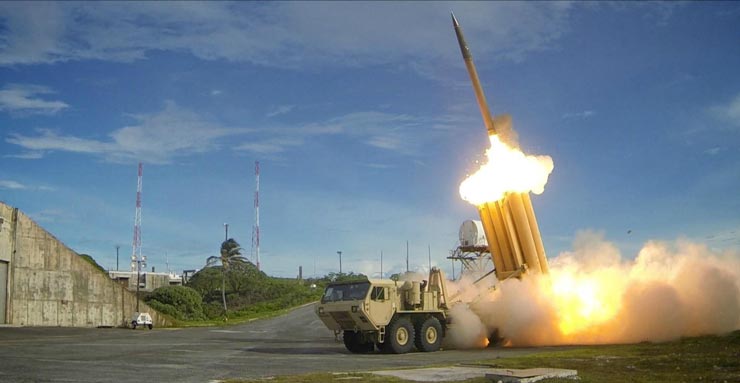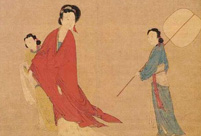


SEOUL, Aug. 8 -- South Korean President Park Geun-hye appears perplexed at six first-term lawmakers of the main opposition Minju Party who left for China as they are against the deployment of Terminal High Altitude Area Defense (THAAD).
The six anti-THAAD lawmakers reportedly left for Beijing on Monday morning to exchange opinions with Chinese experts about the THAAD deployment in South Korea. During the three-day stay, they are set to hold a meeting with South Koreans living in China and South Korean correspondence there.
The lawmakers were scheduled to meet South Korean ambassador to China Kim Jang-soo right after arriving in Beijing, but the meeting was reportedly canceled as President Park criticized their visit to China.
During her meeting with senior presidential secretaries on Monday, Park denounced their visit as it split public opinion further over the THAAD deployment. Park said she is ready to receive any criticism as she believes THAAD is aimed at protecting South Koreans from the Democratic Peoples Republic of Korea (DPRK)s nuclear and missile threats.
Her comments were based on a wrong belief that THAAD can be a cure-all. Seoul and Washington agreed early last month to install one THAAD battery, composed of six mobile launchers, 48 interceptors and an X-band radar and a fire control system, by the end of next year.
The THAAD battery is incapable of fending off all DPRK's missiles targeting South Korea, while excluding Seoul and its adjacent metropolitan areas from the protection coverage as the battery is to be installed in Seongju county, some 250 km southeast of the capital city. THAAD interceptors have a maximum range of 200 km.
It is absurd to claim that the THAAD battery is aimed at defending from the DPRKs nuclear and missile threats as South Koreas most populous regions are excluded from protection. Rather, it indicates South Korea joining the U.S. Pivot-to-Asia strategy to supervise and check China and Russia.
THAAD in South Korea triggered strong oppositions from China and Russia as the X-band radar can peer into Chinese and Russian territories. Seoul claims it will adopt the radar with a detectable range of 600-800 km, but it can be converted at any time into the radar spotting at least 2,000 km.
As the THAAD battery is to be operated by U.S. Forces Korea (USFK), South Koreas military will have no right to intervene in the U.S. operations and will never know what is happening inside the U.S. missile base.
The presidential office Cheong Wa Dae said Sunday that China should pose a problem on the DPRK more strongly for its nuclear development, seeking to shift responsibility for the DPRKs nuclear program to China. Seoul has claimed that if the Korean peninsula is denuclearized, the THAAD battery will not deployed in its territory.
Such claim is ridiculous as the DPRKs nuclear development came amid hard-line policies from the United States and South Korea. As Seouls former unification minister said in a recent interview with Xinhua, the only way to denuclearize the peninsula is to hold peace talks between the U.S. and the two Koreas and change the armistice treaty after the 1950-53 Korean War into a peace treaty.
Jeong Se Hyun, who served as unification minister for two and a half years from 2002, said South Koreas super hard-line policy toward the DPRK led Seoul to be caught in a snare laid by the U.S., which he said means the U.S. military strategy in East Asia to check and pressure China and Russia together with South Korea and Japan.
President Parks office asked the anti-THAAD lawmakers to call off their visit to China. If the visit was cancelled, it would have caused more serious troubles as it means President Park blocking a try from the political circle to find a breakthrough in the THAAD issue.
Calls to review the THAAD deployment decision are running higher in the political circle. Shim Sang-jung, chief of the minor Justice Party, said on Monday that Seouls diplomacy completely got lost, criticizing the government regarding those against THAAD as pro-DPRK followers or betrayers.
Floor leader Park Ji-won of the Peoples Party, which exercises a casting vote between the ruling and the main opposition parties, said the presidential office must not ruin diplomatic relations between South Korea and China, calling for the Cheong Wa Dae to consider what is in Seouls national interests.
 Spectacular bridge with one of the tallest piers in the world
Spectacular bridge with one of the tallest piers in the world Magnificent view of Hukou Waterfall
Magnificent view of Hukou Waterfall A glimpse of Stride 2016 Zhurihe B military drill
A glimpse of Stride 2016 Zhurihe B military drill US Navy chief tours Liaoning aircraft carrier
US Navy chief tours Liaoning aircraft carrier Chinese American woman wins Miss Michigan
Chinese American woman wins Miss Michigan Centenarian couple takes first wedding photos
Centenarian couple takes first wedding photos Traditional Tibetan costumes presented during fashion show
Traditional Tibetan costumes presented during fashion show How did ancient people escape the summer heat
How did ancient people escape the summer heat Breathtaking scenery of Hulun Buir grassland
Breathtaking scenery of Hulun Buir grassland Top 10 livable Chinese cities
Top 10 livable Chinese cities Top 20 hottest women in the world in 2014
Top 20 hottest women in the world in 2014 Top 10 hardest languages to learn
Top 10 hardest languages to learn China’s Top 10 Unique Bridges, Highways and Roads
China’s Top 10 Unique Bridges, Highways and Roads Risk management key to peace at sea
Risk management key to peace at sea  Wannabe actors in China's Hollywood
Wannabe actors in China's Hollywood  Horton displays no goodwill in remarks over his rival
Horton displays no goodwill in remarks over his rival  China’s athletes in Brazil only dine on meals prepared by Chinese chefs
China’s athletes in Brazil only dine on meals prepared by Chinese chefs Day|Week